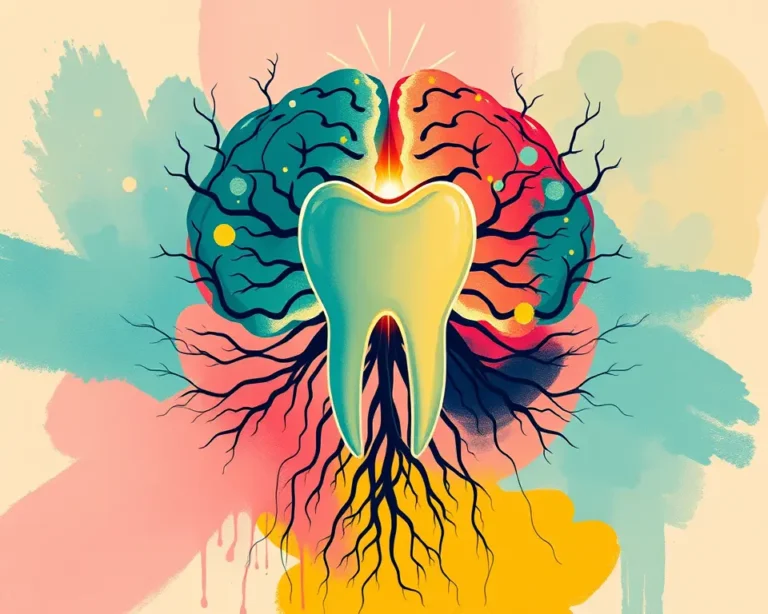It’s no secret that physical and mental health are intertwined, but the connection between oral health and mental well-being is often overlooked. Maintaining a healthy mouth goes beyond just preventing cavities; it significantly impacts your self-esteem, social interactions, and overall psychological state. Research indicates a strong correlation between oral health problems and mental health issues like anxiety and depression. Let’s explore this surprising link and discover how taking care of your teeth and gums can contribute to a happier, healthier mind.
The Mouth-Mind Connection: An Overview
The relationship between oral health and mental health is a two-way street. Poor oral health can negatively affect mental well-being, and vice versa. Dr. Michael Glick, executive director of the University of Pennsylvania’s Center for Integrative Global Oral Health, emphasizes that oral health and mental health are intricately connected. Poor oral health can affect a person’s ability to speak, smile, chew, and swallow comfortably, impacting their social and psychological attributes, which can then affect their quality of life.
How Poor Oral Health Impacts Mental Well-being
- Chronic Pain: Conditions like gum disease or tooth decay can lead to persistent pain and discomfort, increasing stress, anxiety, and even depression. Studies have shown that individuals with poor oral health are more likely to experience symptoms of depression and anxiety.
- Self-Esteem and Social Confidence: The appearance of your teeth and mouth significantly affects your self-esteem. A healthy, attractive smile boosts self-confidence and self-worth, while missing or discolored teeth can lead to embarrassment and self-consciousness, impacting social interactions and overall quality of life. People struggling with dental problems may withdraw from social situations, exacerbating feelings of loneliness and potentially leading to depression.
- Inflammation: Oral health issues, such as gum disease, can cause chronic inflammation, triggering the release of cytokines, proteins that can travel in your blood and affect brain function. This inflammatory response has been linked to mood disorders, including depression and anxiety.
- Nutrition and Mood: Dental problems can make it difficult to chew and eat a balanced diet, leading to nutritional deficiencies that impact mood and cognitive function. Insufficient intake of vitamins and minerals can lead to fatigue and irritability.
- Social Isolation: Advanced gum disease and tooth loss can cause people to smile less and feel self-conscious or ashamed, which can lead to increased isolation, a major factor in mental decline, depression, and anxiety.
How Mental Health Impacts Oral Health
- Poor Oral Hygiene: Mental health conditions such as depression and anxiety can lead to poor oral hygiene habits, including neglecting regular brushing and flossing, as well as skipping dental appointments. This increases the risk of developing oral health problems such as cavities, gum disease, and tooth loss. It can also result in bad breath (halitosis), which can contribute to social anxiety.
- Teeth Grinding (Bruxism): Stress and anxiety can lead to teeth grinding (bruxism), which can occur during waking hours or while asleep. Bruxism can cause tooth damage, jaw pain, headaches, and other issues.
- Eating Disorders: Eating disorders can have severe consequences on oral health. For example, frequent vomiting in bulimia can erode tooth enamel, leading to decay and sensitivity.
- Medication Side Effects: Certain psychiatric medications can have side effects that impact oral health. For instance, some medications can cause dry mouth (xerostomia), which increases the risk of cavities and gum disease.
- Neglect of Oral Health: Individuals with severe mental disorders, like bipolar disorder and schizophrenia, have a higher chance of poor dental hygiene and tooth loss due to factors like impaired well-being, psychiatric treatment side effects, and persistent stress.
The Role of Inflammation
Inflammation is a key factor linking oral and mental health. Chronic inflammation, whether stemming from gum disease or other sources, is now recognized as a major contributor to mental health issues like depression and cognitive decline.
How Inflammation Affects Mental Health
- Neurotransmitter Imbalance: Inflammation may disrupt brain chemicals (neurotransmitters) like serotonin and dopamine, leading to mood imbalances.
- Hormonal Disruption: Inflammation can affect stress and sex hormone levels (e.g., cortisol, estrogen), impacting mood and cognition.
- Neuroinflammation: Inflammation within the brain itself can cause cognitive and mood problems.
- Reduced Neuroplasticity: Chronic inflammation may hinder the brain’s ability to adapt and learn.
Common Causes of Inflammation
- Chronic stress
- Poor diet
- Lack of physical activity
- Sleep disorders
- Gut dysbiosis
- Toxin exposure
Bruxism: Grinding Away at Mental Health
Bruxism, or teeth grinding, is a common condition often linked to stress and anxiety. It involves clenching, grinding, or gnashing teeth, usually subconsciously, either during waking hours or during sleep.
Types of Bruxism
- Awake Bruxism: Grinding or clenching during waking hours, often linked to stress, anxiety, or concentration.
- Sleep Bruxism: Grinding or clenching during sleep, which can be more damaging because the individual is unaware of it.
Causes and Risk Factors
- Stress and Anxiety: Feeling overwhelmed and stressed can result in bruxism.
- Lifestyle Habits: Smoking, alcohol consumption, and excessive caffeine intake are associated with a higher risk of bruxism.
- Certain Medications: Some medications, including certain antidepressants, can increase the risk of bruxism.
- Sleep Disorders: Conditions like sleep apnea are linked to bruxism.
- Personality Type: Having an aggressive, competitive, or hyperactive personality can raise the risk of bruxism.
Managing Bruxism
- Stress Reduction Techniques: Practicing mindfulness, meditation, and relaxation techniques can help reduce stress and anxiety, thereby reducing bruxism.
- Mouth Guards: Custom mouth guards can protect teeth from the effects of grinding, especially during sleep.
- Counseling: Cognitive behavior therapy can help address underlying stress and anxiety issues.
- Good Sleep Habits: Establishing a regular sleep schedule and creating a relaxing bedtime routine can improve sleep quality and reduce bruxism.
Practical Steps to Improve Oral and Mental Health
Integrating simple practices into your daily routine can significantly improve both your oral and mental health.
Oral Hygiene Practices
- Brush Twice Daily: Brush your teeth twice a day using a soft-bristled toothbrush and fluoride toothpaste.
- Floss Daily: Floss every day to remove plaque and food particles from between your teeth.
- Use Mouthwash: Use an antibacterial mouthwash to help kill bacteria and freshen breath.
- Regular Dental Check-ups: Schedule routine dental visits for check-ups and cleanings to detect and treat potential issues early.
Lifestyle Adjustments
- Healthy Diet: Consume a balanced diet rich in vitamins and minerals, including plenty of fruits, vegetables, lean proteins, and whole grains. Limit sugary and acidic foods to prevent cavities and gum disease.
- Stress Management: Incorporate stress-reduction practices into your daily life, such as meditation, yoga, exercise, or hobbies.
- Quit Smoking: Smoking has detrimental effects on both oral and mental health.
- Limit Alcohol Intake: Excessive alcohol consumption can negatively impact both oral and mental health.
- Good Sleep Hygiene: Develop good sleep habits to improve sleep quality and reduce stress.
Mindful Practices
- Mindful Oral Hygiene: Pay attention to the sensations in your mouth while brushing and flossing, turning it into a calming ritual.
- Smile More: Smiling has been found to affect emotion, which can lower stress levels and affect heart health.
Integrated Care: A Holistic Approach
Recognizing the close relationship between oral and mental health calls for an integrated approach to healthcare.
Key Components of Integrated Care
- Collaboration between Healthcare Providers: Mental health professionals and dental professionals should collaborate to provide comprehensive care.
- Early Diagnosis: Screening for oral health issues during mental health assessments, and vice versa, can lead to early diagnosis and intervention.
- Patient Education: Educating patients about the connection between oral and mental health empowers them to take proactive steps to improve their overall well-being.
- Preventive Approach: Public health programs should incorporate preventive measures for both oral and mental health to reduce healthcare costs and improve patient outcomes.
The Brighter Side: Benefits of a Healthy Smile
Maintaining good oral hygiene and having an appealing smile can significantly boost self-confidence and improve mental well-being.
Psychological Benefits
- Increased Self-Esteem: A healthy smile can make you feel more confident and attractive.
- Improved Social Interactions: Feeling good about your smile can make you more inclined to socialize and engage in relationships.
- Reduced Anxiety and Depression: Taking care of your oral health can reduce the risk of developing anxiety and depression related to dental issues.
- Enhanced Quality of Life: A healthy mouth contributes to overall well-being and a higher quality of life.
Conclusion
The link between oral health and mental wellness is undeniable. By understanding this connection and taking proactive steps to care for your teeth and gums, you can significantly improve your mental health and overall quality of life. Embrace a holistic approach to health that includes regular dental check-ups, good oral hygiene practices, stress management techniques, and a balanced lifestyle. Remember, a healthy smile is not just about aesthetics; it’s a gateway to a happier, healthier mind.







